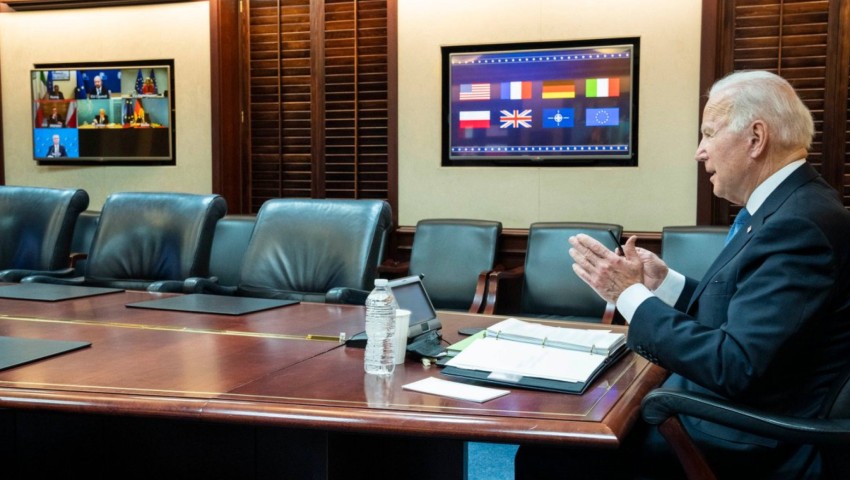How will the United States’ response to tensions in Eastern Europe shape its strategy in the Indo-Pacific?
To continue reading the rest of this article, please log in.
Create free account to get unlimited news articles and more!
The drums of war continue to beat in Eastern Europe as Russia flexes its military muscle along its border with Ukraine.
A diplomatic resolution seems unlikely at this stage, with NATO powers yet to reach a compromise with Russian President Vladimir Putin.
Observers fear a Russian invasion will be just the start of a long, drawn-out conflict, embroiling neighbouring countries and much of the West.
The nature of a Western intervention remains unclear, with the US and its European allies keeping their cards close to their chests.
The Biden administration faces a serious strategic dilemma, with a Russia-Ukraine clash threatening to distract from its ambitions in the Indo-Pacific as it looks to counter China’s growing influence.
According to Ashley Townshend, director, foreign policy and defence at the United States Studies Centre, Washington’s allies in the Indo-Pacific will be watching closely.
He notes the Biden administration’s efforts to reassure partners that it “can walk and chew gum at the same time”, exemplified by Secretary of State Anthony Blinken’s recent visit to Australia for the Quad Foreign Ministers’ Meeting.
But Townshend suspects the US may encounter scepticism from Canberra, New Delhi, Tokyo, and key Southeast Asian partners.
He claims the Biden administration must act with restraint in Eastern Europe to safeguard its credibility and strategic position in the Indo-Pacific.
“This doesn’t mean abandoning Kyiv, ignoring NATO’s security concerns, or looking the other way from the invasion of a sovereign country,” he writes.
“But it does mean keeping the Ukraine crisis in a global strategic perspective — and addressing it in a disciplined way that preserves finite attention and resources for Washington’s ‘priority theatre’.”
Townshend says Indo-Pacific partners would be relatively pleased with Washington’s handling of Russia-Ukraine tensions thus far as it backs Ukraine’s territorial integrity “without extending security commitments”.
“It has pursued diplomatic off-ramps with Moscow without appeasing coercion,” he continues.
“[The US] sent a small number of troops to reassure front-line NATO allies and provided lethal military aid to bolster Kyiv’s self-defence while making it clear that US forces won’t be deployed against Russia to save Ukraine.
“Above all, the administration has tried hard — albeit, with limited success — to build international cohesion for a sanctions package that it hopes will deter Moscow with the threat of devastating economic punishment.”
While conceding that Washington’s approach may not curtail Russian aggression, Townshend argues it “comports with Indo-Pacific preferences for a firm but restrained US strategy”.
Townshend points out that the US cannot commit conventional military deterrence in Europe and the Indo-Pacific and would instead need to “conserve strength” and “make difficult trade-offs”.
“Accordingly, for a peripheral US interest in a secondary theatre like Ukraine, Washington is correct to rely on economic punishment, allied burden-sharing, and resistance by local forces to deter or respond to a Russian invasion,” he adds.
“A strategy of military deterrence would simply be too resource intensive, drawn out, and potentially escalatory to justify Indo-Pacific opportunity costs.”
Townshend goes on to argue that contrary to popular belief among geopolitical analysts within the United States, a “harder line” on Ukraine would not build trust among Indo-Pacific partners grappling with the Chinese threat.
“[A] dangerous myth is taking hold in US policy debates that misrepresents the geopolitical linkages between the United States’ conduct in Ukraine and its strategic position in the Indo-Pacific,” he writes.
“Pushed by both foreign-policy hawks and liberal internationalist purists, it goes something like this — if the United States doesn’t project military strength against Russian aggression, China will have a green light to use force in its part of the globe, and Washington’s Indo-Pacific allies and partners will lose all confidence in the United States’ security guarantees.
“This isn’t how Indo-Pacific countries think about deterrence and reassurance.”
According to Townshend, Washington’s Indo-Pacific allies do not expect the US’ military resolve in Eastern Europe to deter or encourage Beijing aggression.
“Such a notion is facile, echoing last year’s widely discredited arguments and Chinese propaganda suggesting that Washington’s withdrawal from Afghanistan would embolden Beijing. It hasn’t,” he writes.
“Chinese leaders generally have proved to be arch-pragmatists. Their decisions to use force are far more likely to be based on the prevailing balance of interests and hard power — which, in north-east Asia, is rapidly tilting in China’s favour.”
Townshend suggests a harder line in Eastern Europe could instead work in Beijing’s interests by forcing the US to exhaust resources in another part of the world.
“Not surprisingly, this is also why Washington’s allies and partners aren’t assessing its credibility as an Indo-Pacific power based on how tall it stands in Ukraine. Quite the opposite, in fact,” he adds.
“Having been promised a US pivot to Asia for more than a decade, Washington’s regional friends are far more interested in how successfully the Biden administration can minimise its exposure in Ukraine and pick up momentum in the Indo-Pacific.”
Despite this, some fear Secretary Blinken’s visit to the Indo-Pacific suggests Washington’s stance on Ukraine may be “metamorphosising into something more demanding”.
“US cabinet-level attention is fixated on defusing the crisis and strengthening European solidarity on sanctions against Russia,” Townshend observes.
“The administration’s long-awaited National Security Strategy and National Defense Strategy have been delayed, apparently due to concerns that their emphasis on Indo-Pacific challenges would appear ill-timed and may require a rethink.
“Calls for new funding packages to bolster European deterrence are making the rounds.”
He claims President Biden may succumb to pressure if Russia does launch an invasion into Ukraine.
“Blinken’s job is to explain to his Indo-Pacific counterparts why these worst-case fears won’t come to pass,” Townshend writes.
“… If the administration can’t hold the line of restraint over the coming months, its credibility and strategic position will suffer in the Indo-Pacific.”
Get involved with the discussion and let us know your thoughts on Australia’s future role and position in the Indo-Pacific region and what you would like to see from Australia's political leaders in terms of partisan and bipartisan agenda setting in the comments section below, or get in touch with
Charbel Kadib
News Editor – Defence and Security, Momentum Media
Prior to joining the defence and aerospace team in 2020, Charbel was news editor of The Adviser and Mortgage Business, where he covered developments in the banking and financial services sector for three years. Charbel has a keen interest in geopolitics and international relations, graduating from the University of Notre Dame with a double major in politics and journalism. Charbel has also completed internships with The Australian Department of Communications and the Arts and public relations agency Fifty Acres.

 Login
Login








